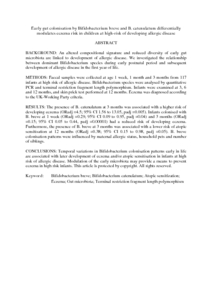Citation
Ismail, Intan Hakimah and Boyle, Robert J. and Licciardi, Paul V. and Oppedisano, Frances and Lahtinen, Sampo and Roy M., Robins Browne and Tang, Mimi L. K.
(2016)
Early gut colonisation by Bifidobacterium breve and B. catenulatum differentially modulates eczema risk in children at high-risk of developing allergic disease.
Pediatric Allergy and Immunology, 27 (8).
pp. 838-846.
ISSN 0905-6157; ESSN: 1399-3038
Abstract
BACKGROUND: An altered compositional signature and reduced diversity of early gut microbiota are linked to development of allergic disease. We investigated the relationship between dominant Bifidobacterium species during early postnatal period and subsequent development of allergic disease in the first year of life.
METHODS: Faecal samples were collected at age 1 week, 1 month and 3 months from 117 infants at high risk of allergic disease. Bifidobacterium species were analysed by quantitative PCR and terminal restriction fragment length polymorphism. Infants were examined at 3, 6 and 12 months, and skin prick test performed at 12 months. Eczema was diagnosed according to the UK-Working Party criteria.
RESULTS: The presence of B. catenulatum at 3 months was associated with a higher risk of developing eczema (ORadj =4.5; 95% CI 1.56 to 13.05, padj =0.005). Infants colonised with B. breve at 1 week (ORadj =0.29; 95% CI 0.09 to 0.95, padj =0.04) and 3 months (ORadj =0.15; 95% CI 0.05 to 0.44, padj =0.00001) had a reduced risk of developing eczema. Furthermore, the presence of B. breve at 3 months was associated with a lower risk of atopic sensitisation at 12 months (ORadj =0.38; 95% CI 0.15 to 0.98, padj =0.05). B. breve colonisation patterns were influenced by maternal allergic status, household pets and number of siblings.
CONCLUSIONS: Temporal variations in Bifidobacterium colonisation patterns early in life are associated with later development of eczema and/or atopic sensitisation in infants at high risk of allergic disease. Modulation of the early microbiota may provide a means to prevent eczema in high risk infants. This article is protected by copyright. All rights reserved.
Download File
![[img]](http://psasir.upm.edu.my/55578/1.hassmallThumbnailVersion/Early%20gut%20colonisation%20by%20Bifidobacterium%20breve%20and%20B.%20catenulatum%20differentially%20.pdf)  Preview |
|
PDF (Abstract)
Early gut colonisation by Bifidobacterium breve and B. catenulatum differentially .pdf
Download (5kB)
| Preview
|
|
Additional Metadata
Actions (login required)
 |
View Item |

